In October 2022, the Ministry of Education’s CAMPUS Asia Program to Nurture Public Health Leaders saw its first-ever double-degree Ph.D. holder, Wang Xiaowen, graduating from both Chinese and Japanese universities since the founding of the program in October 2016. Her graduation marks a new milestone. She is also the first Ph.D. graduate in the study of public health and medicine with a degree from Chinese and Japanese universities. Her success is a significant moment worth commemorating. An introduction to Xiaowen and her account of life abroad follows below. Her experience will be sure to inspire more students within and beyond the program.
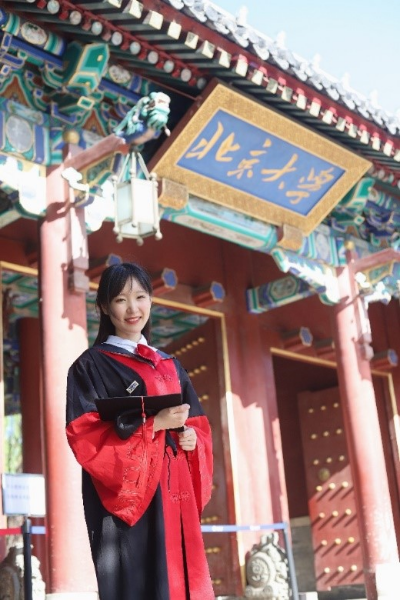
Graduation Photo Taken at Peking University
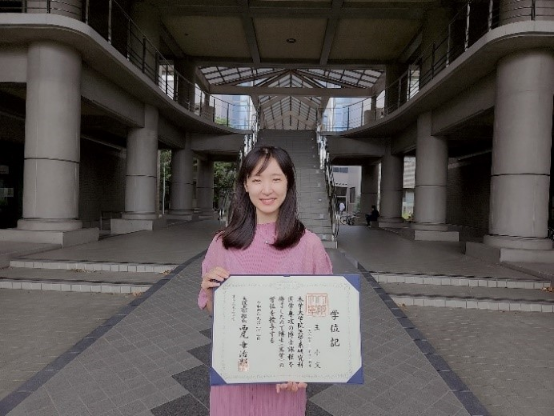
Receiving the Certificate of Degree in Japan
[Introduction of Wang Xiaowen]
Wang Xiaowen is a straight-to-Ph.D. student in grade 2017 at theDepartment ofEpidemiology andBiostatistics in theSchool of PublicHealth at Peking University. She applied for the double-degree Ph.D. under the CAMPUS Asia Program in October 2019 and studied at Osaka University. She received her Ph.D. in medicine from Peking University in June 2022 and from Osaka University in September. During her doctoral studying, shewas awarded the Outstanding Graduate, the Pacemaker to Merit Student, and the Outstanding Student of Peking University, and she won the National Scholarship twice and the Academic Innovation Award of Peking University, among others.
In October 2019, with the support of the CAMPUS Asia Program, I started my 18-month-long double-degree doctoral education at Osaka University, which is also China’s first double-degree doctoral program for medicine. Now I have graduatedwith my medical Ph.D. from Peking University and Osaka University. The past three years taught me a lot as a precious experience, and I am honored to share a piece of my mind on this fascinating journey.
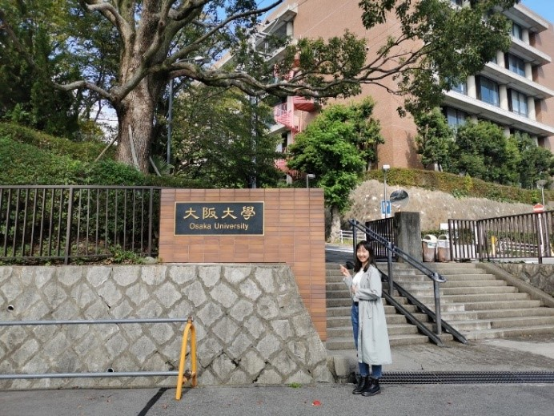
Wang Xiaowen at Osaka University
[Life Abroad]
I first came to know the CAMPUS Asia Program in March 2019, when I studied for 3 weeks at Osaka University as an exchange student. In October of that year, I received an admission letter from Osaka University and started my journey as a double-degree doctoral student. Living in a foreign landset new expectations but was also awash with challenges due to the language barrier and unfamiliar social environment. Just like other life-loving and ambitious peers, I made great efforts to adapt to my academic and daily life in Japan. Thanks to the credit mutual-recognition system adopted by both universities, I was freed from some basic theoretical courses and could focus on courses for practical applications and pioneering research. As time permitted, I would attend the weekly research lectures on varioussubjects. My year-long elective language course increased my Japanese proficiency and I became capable of communicating with local people without barriers.
As for research, professors in the lab always stressed rationale and details of the research. Students were asked to write research proposals on topics of their choice. I would actively discuss topics with teachers in the lab and my research rolled out quickly based on the established sequences and database. Repetitive rounds of discussion with professors, revising the research paper for the better, and writing numerous essays enhanced my independent research competence. By the time of graduation, I have published 13 SCI papers (8 in the JCR Q1 journals, 4 in the Q2, with the CIF at around 70). I also attended international meetings organized by CAMPUS Asia in Seoul and Osaka, where I reported my research achievements.
During the outbreak of the pandemic, I volunteered to distribute health kits at Osaka University. In my spare time, I traveled to places like Tokyo, Osaka, Kyoto, Wakayama, Shikoku, Shizuoka, the Hokuriku region, and Hokkaido. I smelled the romanticsakura in spring and saw bellowing sea waves in summer. I was impressed by mountains covered with fiery red maple leaves in autumn and warmed up by steamy hot springs in winter. Countless memorable landscapes and heart-touching moments walked me through the diversity of the world and the possibilities of life, affirming my pursuance of the future I admired. With an open mind and a broad vision, I realized that a student at Peking University was entrusted to seek his/her responsibility and accountability for the world.
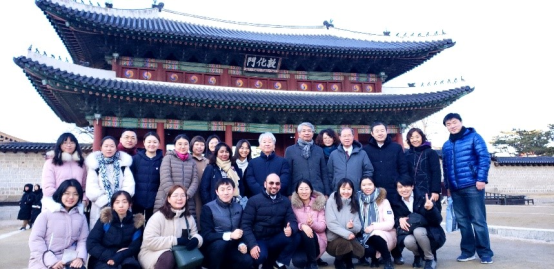
Teachers and Students of CAMPUS Asia from China, Japan, and the Republic of Korea; January 2020 in Seoul
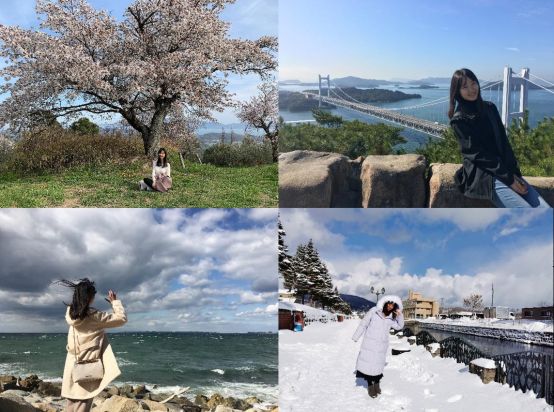
Photos with Scenic Views
[Gratitude for Teachers]
My journey in Japan has been an unforgettable part of my academic career. I want to thank Professor Hu Yonghua, my supervisor, and Professor Wang Peiyu, who is in charge of the CAMPUS Asia Program, for kindly taking care of me and helping me acquire my Ph.D. granted by the two universities. They always considered all my critical events and time arrangements in Japan, even my flight and quarantine schedules. Their encouragement and support fueled my courage and confidence to make constant progress.
I would like to extend my appreciation to Professor Iso, Professor Sobue, Professor Shirai, Mr. Ehab, and Mr. Dong Jiayi at Osaka University for their guidance and support. I am grateful for the efforts of Mr. Liu Jie and Liu Keyang to coordinate the program.My gratitude alsogoesto all teachers in the CAMPUS Asia program for enabling me to become a better version of myself.
Now, my academic career has been drawn to an admirable end. Fish swim with the running water, birds fly with the blowing wind, and trees and grass thrive with the passing seasons. I hope the breeze of CAMPUS Asia canbring me to aplace where I can tap into every bit of my potential. The place, to me, will be like an endless sky to a bird and a boundless sea to a fish.
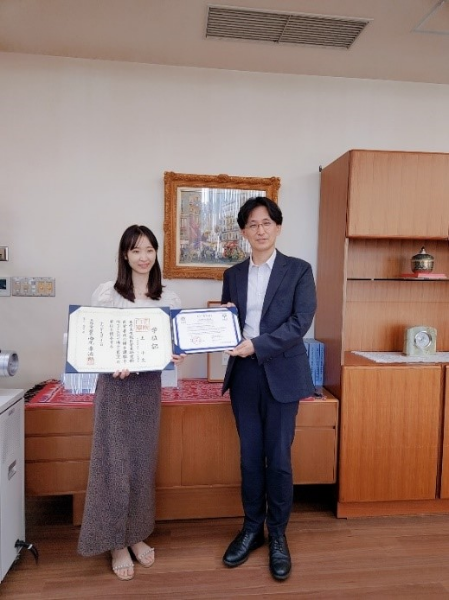
Photos with the Dean of the Graduate School of Medicine at Osaka University
